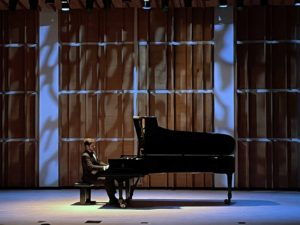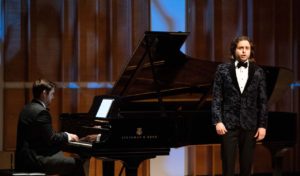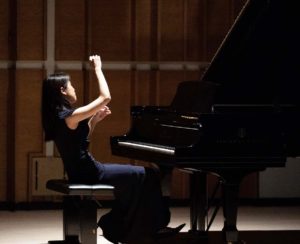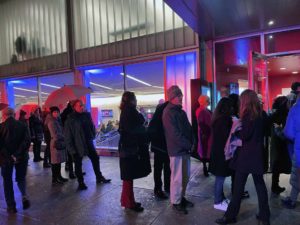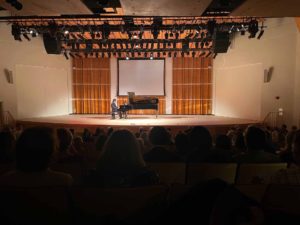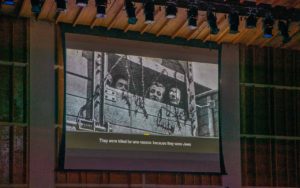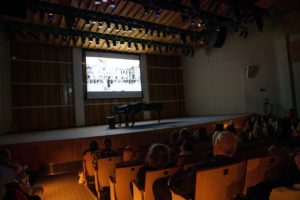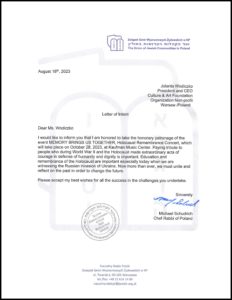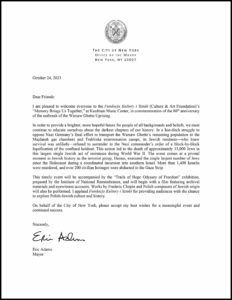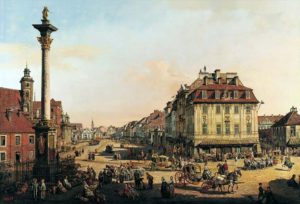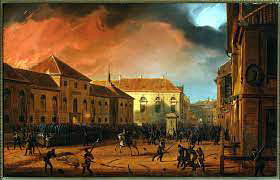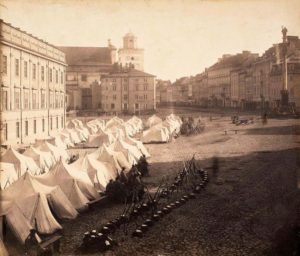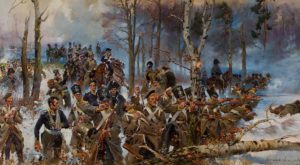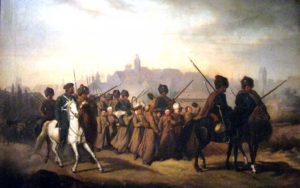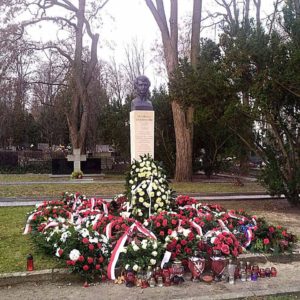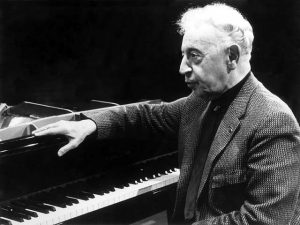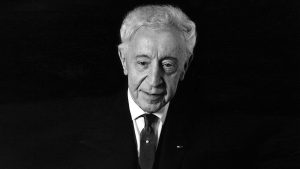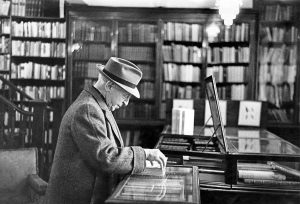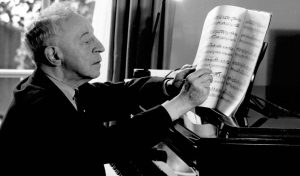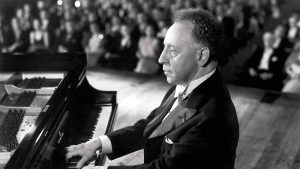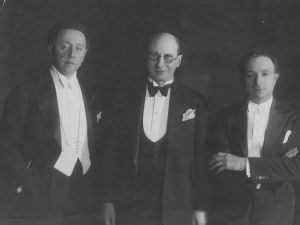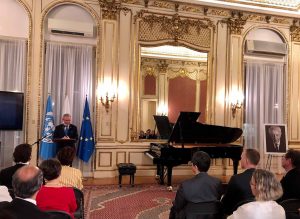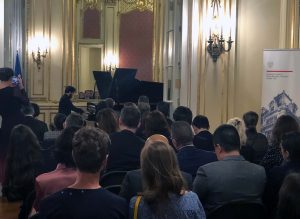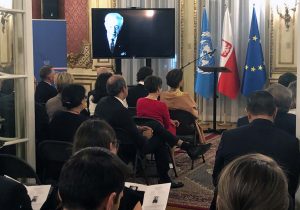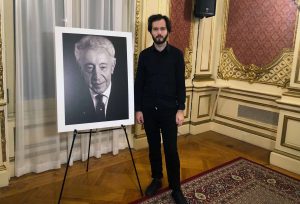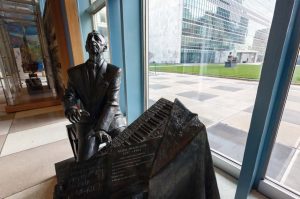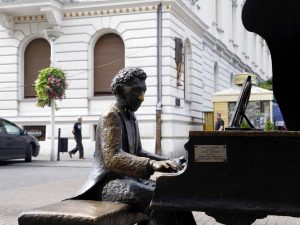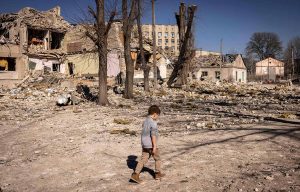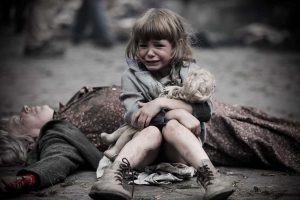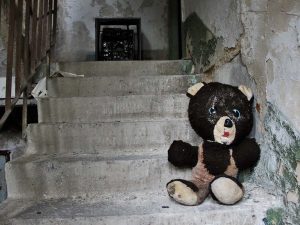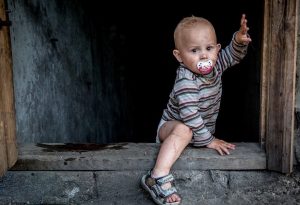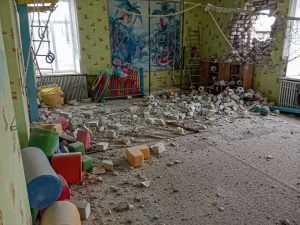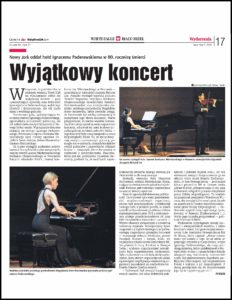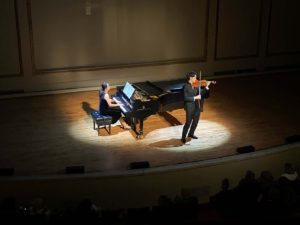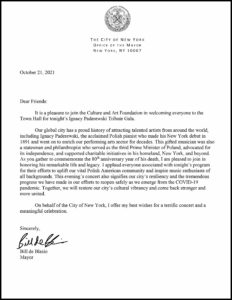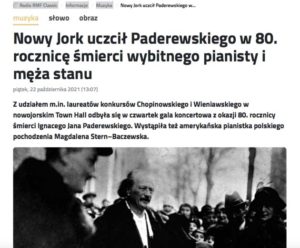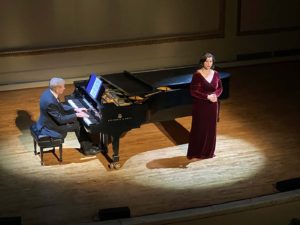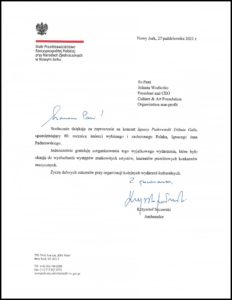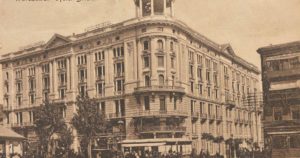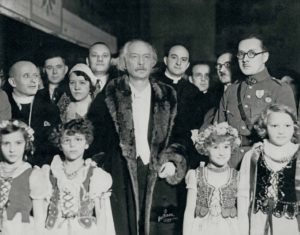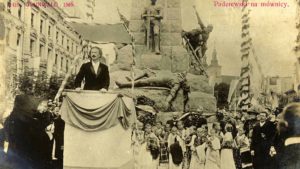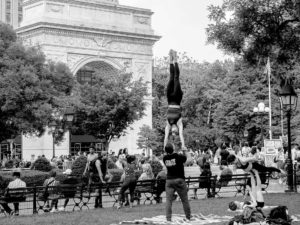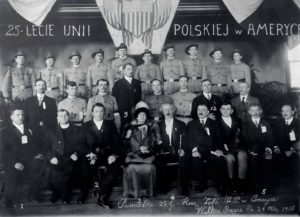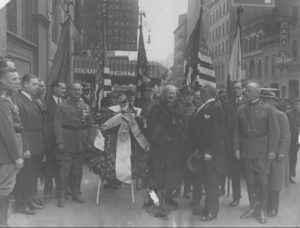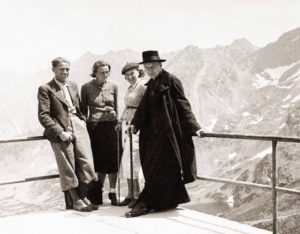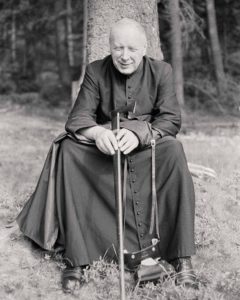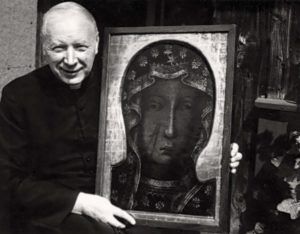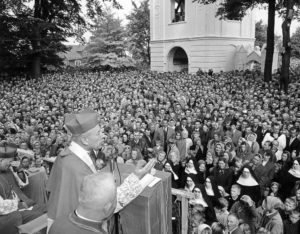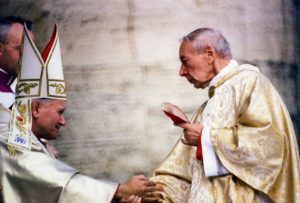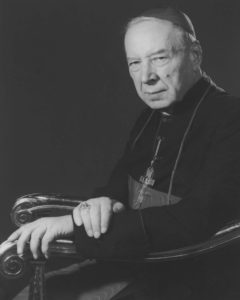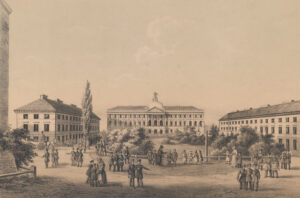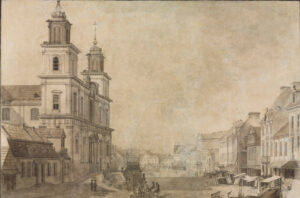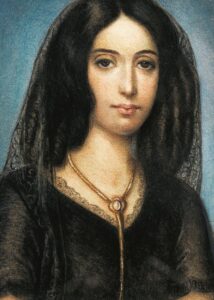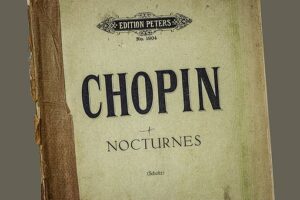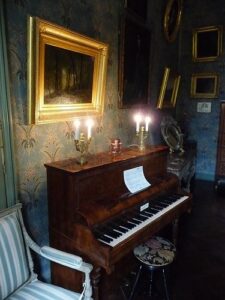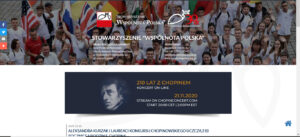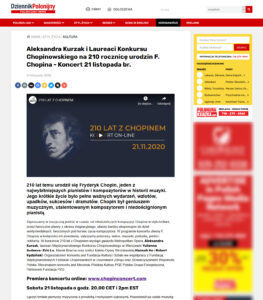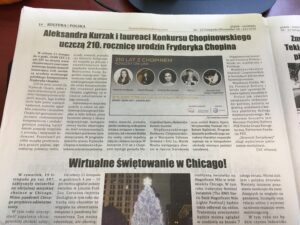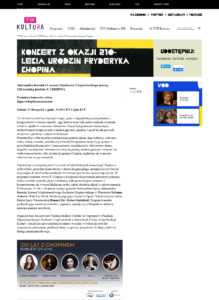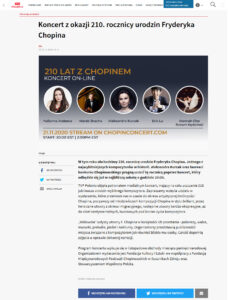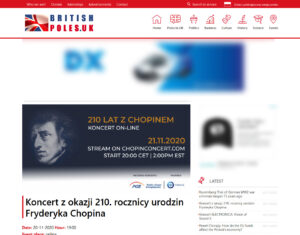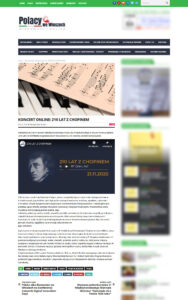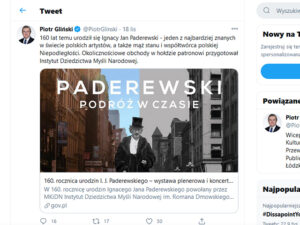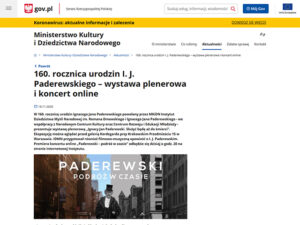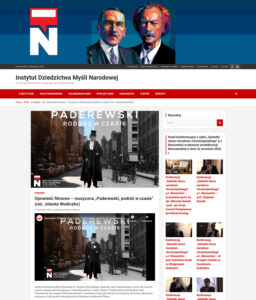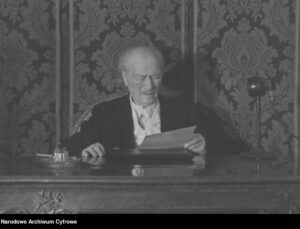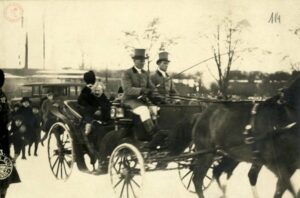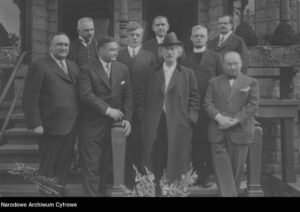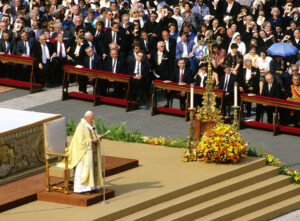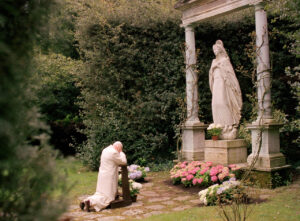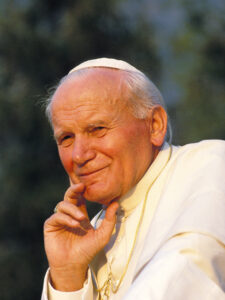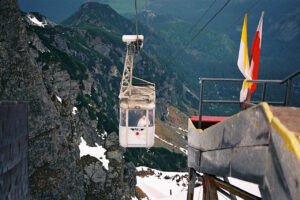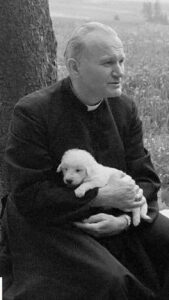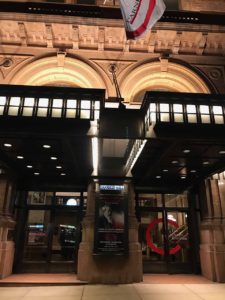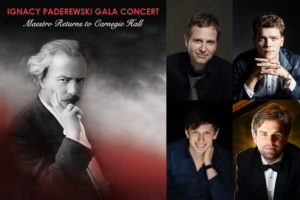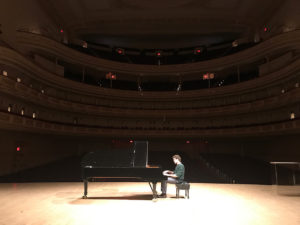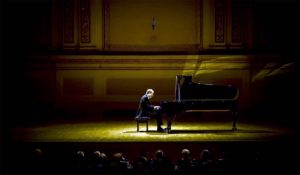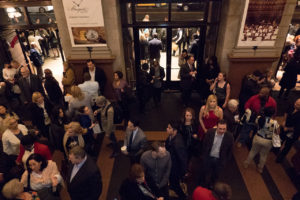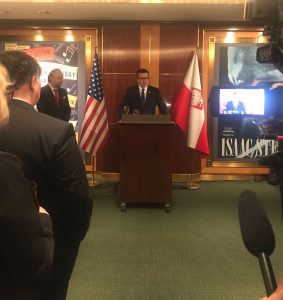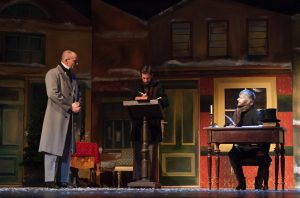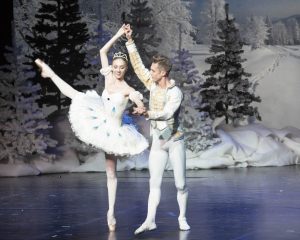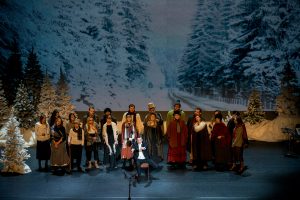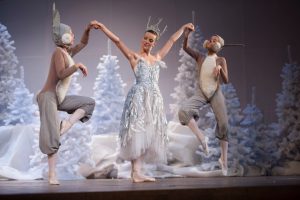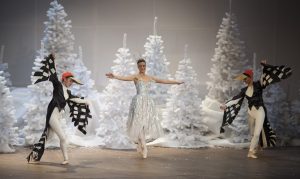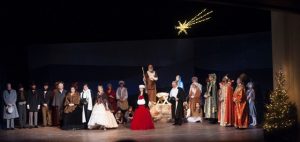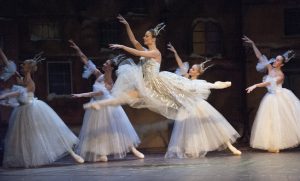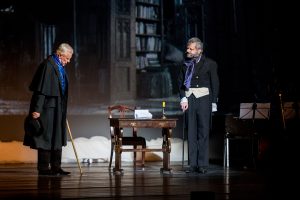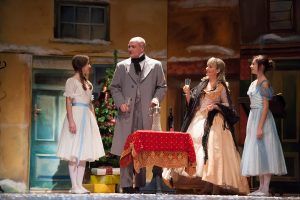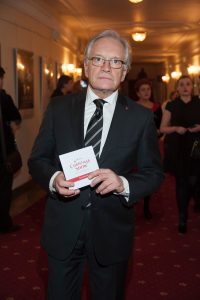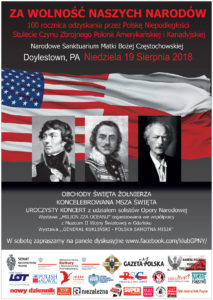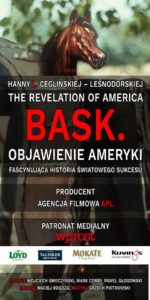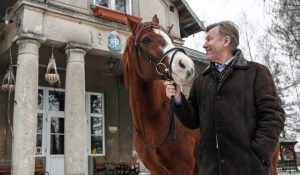Projects
The Best of Polish Composers
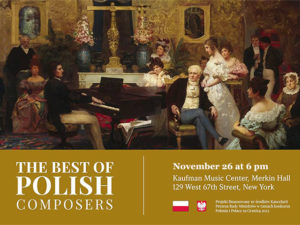 The concert presented the most beautiful works by outstanding Polish composers: Fryderyk Chopin – a piano poet and icon of classical music; Stanisław Moniuszko – father of the Polish National Opera; Henryk Wieniawski – one of the greatest violinists in history; Ignacy Paderewski – the most famous pianist of his time; Karol Szymanowski – the father of Polish music of the 20th century, and Grażyna Bacewicz – a leading Polish composer who introduced Polish classical music to the international mainstream. The songs were performed by outstanding artists. Metropolitan Opera soloist Piotr Buszewski brilliantly performed the song ”Do you know this country” and an aria from the Opera ”The Haunted Manor” by S. Moniuszko, Kate Liu bronze medalist of the 17th International Fryderyk Chopin Piano Competition in Warsaw, performed Chopin’s compositions and charmed the audience with her sensitivity. and musical intuition. As part of the project, a Knowledge Competition about Polish Composers was organized dedicated to young people of Polish origin. Nearly 40 participants took part in the competition, presenting a high level of knowledge, 6 participants were awarded prizes.
The concert presented the most beautiful works by outstanding Polish composers: Fryderyk Chopin – a piano poet and icon of classical music; Stanisław Moniuszko – father of the Polish National Opera; Henryk Wieniawski – one of the greatest violinists in history; Ignacy Paderewski – the most famous pianist of his time; Karol Szymanowski – the father of Polish music of the 20th century, and Grażyna Bacewicz – a leading Polish composer who introduced Polish classical music to the international mainstream. The songs were performed by outstanding artists. Metropolitan Opera soloist Piotr Buszewski brilliantly performed the song ”Do you know this country” and an aria from the Opera ”The Haunted Manor” by S. Moniuszko, Kate Liu bronze medalist of the 17th International Fryderyk Chopin Piano Competition in Warsaw, performed Chopin’s compositions and charmed the audience with her sensitivity. and musical intuition. As part of the project, a Knowledge Competition about Polish Composers was organized dedicated to young people of Polish origin. Nearly 40 participants took part in the competition, presenting a high level of knowledge, 6 participants were awarded prizes.
Memory Brings Us Together
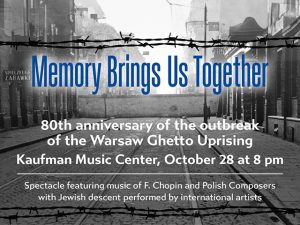 The year 2023 marked the 80th anniversary of the outbreak of the Warsaw Ghetto Uprising, in which the Jewish people took up a heroic fight against the German occupier. The “Memory Brings Us Together” project paid tribute to people who performed extraordinary acts of courage in defense of human dignity. The event was accompanied by an exhibition. The program began with a film with archival materials and eyewitness accounts, in the artistic part was presented works by F. Chopin and Polish composers of Jewish origin.The event was a normous success, was well received by the NY public and NY authority, we received a congratulations letter from the Mayor Eric Adams. Honorary Patronages: Chief Rabbi of Poland Michael Schudrich, Consul General of the Republic of Poland in New York Adrian Kubicki, Partners: PZU Foundation, Emanuel Ringelblum Jewish Historical Institute in Warsaw and the Polish Cultural Institute in New York.
The year 2023 marked the 80th anniversary of the outbreak of the Warsaw Ghetto Uprising, in which the Jewish people took up a heroic fight against the German occupier. The “Memory Brings Us Together” project paid tribute to people who performed extraordinary acts of courage in defense of human dignity. The event was accompanied by an exhibition. The program began with a film with archival materials and eyewitness accounts, in the artistic part was presented works by F. Chopin and Polish composers of Jewish origin.The event was a normous success, was well received by the NY public and NY authority, we received a congratulations letter from the Mayor Eric Adams. Honorary Patronages: Chief Rabbi of Poland Michael Schudrich, Consul General of the Republic of Poland in New York Adrian Kubicki, Partners: PZU Foundation, Emanuel Ringelblum Jewish Historical Institute in Warsaw and the Polish Cultural Institute in New York.
The footsteps of Maurycy Mochnacki in Warsaw
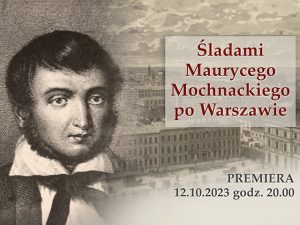 An project aimed to build a collective memory by referring to the places related to Maurycy Mochnacki in Warsaw. We introduced Maurycy Mochnacki, a great patriot and philosopher, the ideological leader of the November Uprising. We presented Mochnacki’s Warsaw and the traces of the uprising struggles, which are often unconsciously completely ignored. Wawrzyniec Rymkiewicz and Tomasz Herbich, professors from the University of Warsaw took part in the project. The event was accompanied by the competition “The footsteps of Maurycy Mochnacki in Warsaw”. The project partner was the Lotto Foundation.
An project aimed to build a collective memory by referring to the places related to Maurycy Mochnacki in Warsaw. We introduced Maurycy Mochnacki, a great patriot and philosopher, the ideological leader of the November Uprising. We presented Mochnacki’s Warsaw and the traces of the uprising struggles, which are often unconsciously completely ignored. Wawrzyniec Rymkiewicz and Tomasz Herbich, professors from the University of Warsaw took part in the project. The event was accompanied by the competition “The footsteps of Maurycy Mochnacki in Warsaw”. The project partner was the Lotto Foundation.
Arthur Rubinstein, The Chopin Poet
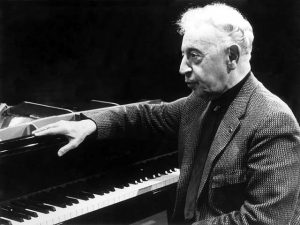 In cooperation with the Permanent Representation of the Republic of Poland to the United Nations, the Culture and Arts Foundation organised at Consulate General of the Republic of Poland in New York an evening on the occasion of National Independence Day dedicated to the memory of Artur Rubinstein, a great pianist and a great Polish patriot in connection with the 135th anniversary of his birth and 40th anniversary of his death in 2022.
In cooperation with the Permanent Representation of the Republic of Poland to the United Nations, the Culture and Arts Foundation organised at Consulate General of the Republic of Poland in New York an evening on the occasion of National Independence Day dedicated to the memory of Artur Rubinstein, a great pianist and a great Polish patriot in connection with the 135th anniversary of his birth and 40th anniversary of his death in 2022.
November 11, 1918 is one of the most important dates in the history of Polish statehood. On this day Marshal Józef Piłsudski became commander-in-chief of the Polish army, and an armistice was concluded in Compiegne, France, marking Germany’s defeat in World War I. This deal was confirmed six months later with the signing of the Treaty of Versailles. After 123 years of partitions by Germany, Russia and Austria – a captivity marked by struggle, death and huge efforts of many generations of Poles. Poland regained its sovereignty. During the annual celebration on November 11th, we honor the memory of those to whom we owe our own state, to whom we managed to raise the country from the enormous destruction of World War I, and create conditions for economic development and modernization. The heroes of that period, despite harassment, arrests, deportations and repression by the partitioners, were able to preserve and develop the national identity to pass it on to future generations. Polish Ambassador to the UN Krzysztof Szczerski referred to Arthur Rubinstein’s patriotic manifestation during the UN inaugural concert in San Francisco, when delegates gathered in the Opera House on May 13, 1945. Due to Stalin’s objections, representatives of Poland were not invited to the conference. When A.Rubinstein realized that there was no Polish flag among the many national flags, he sat down at the piano, played the American anthem in standard fashion and then stood up and addressed the audience: “In this hall, where great nations gather to make a better world, the flag of Poland, over which this cruel war was fought, is missing; and so I will play the Polish national anthem.” He asked the audience of delegates, including Russians, to rise. He then played the Polish anthem, and not at the usual mazurka tempo, but very slowly, ending with a repetition of the last phrase with great force. The audience gave Rubinstein a standing ovation, applause overshadowed applause for any of the speakers.The audience at the Consulate, diplomats from the Permanent Representative to the United Nations applauded the film about A.Rubinstein and the recital of F.Chopin’s music performed by Antoni Boryshevskij, winner of the A.Rubinstein International Piano Competition in Tel Aviv.
The event was organized at the Polish Consulate General in New York in cooperation with the Ambassador to the United Nations, Krzysztof Szczerski. We had the pleasure of hosting diplomats from diplomatic missions to the UN. The large audience applauded a film with archival materials about A.Rubinstein during the inaugural concert of the UN in San Francisco, where A.Rubinstein plays Dąbrowski’s Mazurka. The event at the Polish Consulate ended with a recital of Chopin’s works performed by Antoni Boryszevskij, winner of the A.Rubinstein International Piano Competition in Tel Aviv. The Culture & Art Foundation also implemented an online educational project presenting little-known episodes from the life of Arthur Rubinstein, a great Polish patriot who was one of the greatest and most famous pianists in the world. For Rubinstein Chopin was a force of nature, a man of fire and ice, a fellow patriot who recorded the tragic history of Poland in music. The project Partner was PFR Foundation
We have also implemented an online educational project presenting little-known episodes from the life of Arthur Rubinstein, a great Polish patriot. Arthur Rubinstein (1887–1982) was one of the greatest and most famous pianists in the world. Considered a citizen of the world, his art transcends national borders and has been awarded the highest decorations and orders in the world. Chopin was a force of nature for Rubinstein, a man of fire and ice, a fellow patriot who encapsulated the tragic history of Poland in music.
CHARITY CONCERT FOR THE CHILDREN OF UKRAINE
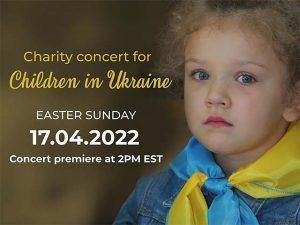 In the middle of brutal Russian aggression against Ukraine and horrific humanitarian crisis children of Ukraine are suffering. The situation is dramatic and in dire need of help. Children are being killed, injured, used as human shields, forced to leave their homes and places where they felt safe. International artists, opera singers and musicians come together to support children in Ukraine which experience deep trauma. The concert featured outstanding artists: soloists of the Metropolitan Opera in New York: Isabel Leonard, Mireille Asselin, Brandie Sutton, Eric Ferring and Adam Płachetka, pianists Kevin Kenner winner and Juror of the Frederic Chopin International Piano Competition in Warsaw, winners of the Arthur Rubinstein International Piano Master Competition: Juan Pérez Floristán (winner in 2021), Antonii Baryshevskyi (winner in 2014) and Steven Lin (second prize in 2014), Avery Gagliano. First Prize and Best Concerto winner of the 10th National Chopin Piano Competition of the United States, recently released debut album “Reflections” on the Steinway & Sons label, Wayne Marshall British conductor, organist and pianist, Conductor of Funkhaus Orchestra Cologne, Symphonic Orchestra Milano, Porgy & Bess in Vienna, Richard Lin Gold Medalist of the 10th Quadrennial International Violin Competition of Indianapolis, 5th prize winner at the International Wieniawski Violin Competition in Poznań, Poland, Robert Lin piano, Takeshi Nagayasu winner of the Chopin Competition of the Kosciuszko Foundation, Nancy Callahan piano, Kamil Pacholec finalist of the last International Fryderyk Chopin Piano Competition in Warsaw, Marek Bracha a versatile pianist performing on modern and historical instruments, violinist Marta Gidaszewska winner of numerous competitions, Michał Francuz a charismatic pianist and teacher, the great ballet soloists Hannah Ho and Robert Kędziński. Concert was organized by the Culture And Art Foundation in cooperation with the Saint Nicholas Foundation, which for 20 years has been helping children all over the world. The Foundation has been running the Santa Claus Day Care Center in Mariupol, which was burned down to the bare ground, and the soldiers who were defending it were killed. Foundation launched the International Logistics Centre in Chorzów Poland, whose aim is to transfer humanitarian aid from Europe to Ukraine. The support of the international audience brought help and encouragement to the innocent and weakest – Children in Ukraine.
In the middle of brutal Russian aggression against Ukraine and horrific humanitarian crisis children of Ukraine are suffering. The situation is dramatic and in dire need of help. Children are being killed, injured, used as human shields, forced to leave their homes and places where they felt safe. International artists, opera singers and musicians come together to support children in Ukraine which experience deep trauma. The concert featured outstanding artists: soloists of the Metropolitan Opera in New York: Isabel Leonard, Mireille Asselin, Brandie Sutton, Eric Ferring and Adam Płachetka, pianists Kevin Kenner winner and Juror of the Frederic Chopin International Piano Competition in Warsaw, winners of the Arthur Rubinstein International Piano Master Competition: Juan Pérez Floristán (winner in 2021), Antonii Baryshevskyi (winner in 2014) and Steven Lin (second prize in 2014), Avery Gagliano. First Prize and Best Concerto winner of the 10th National Chopin Piano Competition of the United States, recently released debut album “Reflections” on the Steinway & Sons label, Wayne Marshall British conductor, organist and pianist, Conductor of Funkhaus Orchestra Cologne, Symphonic Orchestra Milano, Porgy & Bess in Vienna, Richard Lin Gold Medalist of the 10th Quadrennial International Violin Competition of Indianapolis, 5th prize winner at the International Wieniawski Violin Competition in Poznań, Poland, Robert Lin piano, Takeshi Nagayasu winner of the Chopin Competition of the Kosciuszko Foundation, Nancy Callahan piano, Kamil Pacholec finalist of the last International Fryderyk Chopin Piano Competition in Warsaw, Marek Bracha a versatile pianist performing on modern and historical instruments, violinist Marta Gidaszewska winner of numerous competitions, Michał Francuz a charismatic pianist and teacher, the great ballet soloists Hannah Ho and Robert Kędziński. Concert was organized by the Culture And Art Foundation in cooperation with the Saint Nicholas Foundation, which for 20 years has been helping children all over the world. The Foundation has been running the Santa Claus Day Care Center in Mariupol, which was burned down to the bare ground, and the soldiers who were defending it were killed. Foundation launched the International Logistics Centre in Chorzów Poland, whose aim is to transfer humanitarian aid from Europe to Ukraine. The support of the international audience brought help and encouragement to the innocent and weakest – Children in Ukraine.
Concert was held under the Honorary patronage of Archbishop Stanisław Gądecki President of the Polish Bishops Conference, Cardinal Stanislaw Nycz Metropolitan of Warsaw, Adam Struzik Marshal of the Mazowieckie Voivodeship Poland, Stanisław Bonisławski President of Polish Community Association.
IGNACY PADEREWSKI TRIBUTE GALA
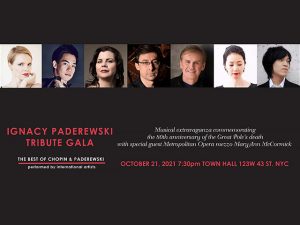 On October 21, 2021, New Yorkers commemorated the 80th anniversary of the death of Ignacy Jan Paderewski who died Manhattan’s Buckingham Hotel in New York City, now The Quin Central Park by Hilton. The gala concert took place at the beautiful Town Hall Theatre in midtown Manhattan. The concert featured outstanding artists, winners of many prestigious music competitions, including the International F. Chopin Piano Competition in Warsaw (Russian pianist Alexander Kobrin), the International H. Wieniawski Violin Competition in Poznan and the 10th International Henryk Wieniawski Violin Competition in Poznan. Wieniawski Competition in Poznań and 10th International Violin Competition in Indianapolis (Taiwanese-American violinist Richard Lin), Kościuszko Foundation Chopin Piano Competition and Jacob Flier Competition winner (Takeshi Nagayasu from Japan) and Magdalena Stern-Baczewska – pianist, Professor of Music and Director of Music Performance Program at Columbia University. She is a laureate of the award of the Polish Minister of Culture for outstanding achievements in promoting Polish culture abroad. Kenneth Merrill is an American pianist and conductor who has collaborated with such artists as Gérard Souzay, Anna Moffo, John Aler, Anthony Dean Griffey, Charlotte Hellekant, Jennifer Aylmer, Randall Scarlata, Faith Esham, Ruth Golden, Jeanette Thompson and William Ferguson. As an opera conductor, he recently conducted Mozart’s Don Giovanni with Nevada Opera and conducted Handel’s Giulio Cesare with Maryland Opera. Kyoung Im Kim a pianist from South Korea and winner of numerous competitions. She performs in Europe, USA and Asia. Special guest for the evening was Metropolitan Opera soloist MaryAnn McCormick, who has over 140 performances on the Metropolitan Opera stage including Valkyrie, Don Carlo, Carmen, La Traviata, The Magic Flute, L’Enfant et Les Sortilèges, Rigoletto, and The Ghosts of Versailles. In the 2015 season, she appeared at the Metropolitan Opera as Giovanna in Verdi’s Ernani conducted by James Levine with Placido Domingo as Carlo. The concert program included works by Polish composers: F. Chopin, I. Paderewski, H. Wieniawski and beautiful atmospheric opera arias. The gala was held under the auspices of the R. Dmowski and I. Paderewski Institute for the Heritage of National Thought, the Polish Congress and the Polish-American Freedom Foundation. Paderewski, Polish American Congress in Washington DC, Consulate General of the Republic of Poland in New York, Polish Cultural Institute in New York, in cooperation with Polish American Congress Charitable Foundation, Taube Philanthropies, Polish & Slavic Federal Credit Union, Pilsudski Institute of America, Polish Supplementary Schools of America, Ignacy Paderewski Festival in Raleigh, Polish Cultural Foundation Clark in New Jersey, Polish Cultural Foundation (PCF) in Boston, Polish Heritage Society in Philadelphia, Nowodworski Foundation, Society of Polish American Travel Agents, and many others. Media patrons: TVP Polonia, Nowy Dziennik, Dziennik Związkowy, Dziennik Polonijny, Kurier Plus, White Eagle, Super Express USA.
On October 21, 2021, New Yorkers commemorated the 80th anniversary of the death of Ignacy Jan Paderewski who died Manhattan’s Buckingham Hotel in New York City, now The Quin Central Park by Hilton. The gala concert took place at the beautiful Town Hall Theatre in midtown Manhattan. The concert featured outstanding artists, winners of many prestigious music competitions, including the International F. Chopin Piano Competition in Warsaw (Russian pianist Alexander Kobrin), the International H. Wieniawski Violin Competition in Poznan and the 10th International Henryk Wieniawski Violin Competition in Poznan. Wieniawski Competition in Poznań and 10th International Violin Competition in Indianapolis (Taiwanese-American violinist Richard Lin), Kościuszko Foundation Chopin Piano Competition and Jacob Flier Competition winner (Takeshi Nagayasu from Japan) and Magdalena Stern-Baczewska – pianist, Professor of Music and Director of Music Performance Program at Columbia University. She is a laureate of the award of the Polish Minister of Culture for outstanding achievements in promoting Polish culture abroad. Kenneth Merrill is an American pianist and conductor who has collaborated with such artists as Gérard Souzay, Anna Moffo, John Aler, Anthony Dean Griffey, Charlotte Hellekant, Jennifer Aylmer, Randall Scarlata, Faith Esham, Ruth Golden, Jeanette Thompson and William Ferguson. As an opera conductor, he recently conducted Mozart’s Don Giovanni with Nevada Opera and conducted Handel’s Giulio Cesare with Maryland Opera. Kyoung Im Kim a pianist from South Korea and winner of numerous competitions. She performs in Europe, USA and Asia. Special guest for the evening was Metropolitan Opera soloist MaryAnn McCormick, who has over 140 performances on the Metropolitan Opera stage including Valkyrie, Don Carlo, Carmen, La Traviata, The Magic Flute, L’Enfant et Les Sortilèges, Rigoletto, and The Ghosts of Versailles. In the 2015 season, she appeared at the Metropolitan Opera as Giovanna in Verdi’s Ernani conducted by James Levine with Placido Domingo as Carlo. The concert program included works by Polish composers: F. Chopin, I. Paderewski, H. Wieniawski and beautiful atmospheric opera arias. The gala was held under the auspices of the R. Dmowski and I. Paderewski Institute for the Heritage of National Thought, the Polish Congress and the Polish-American Freedom Foundation. Paderewski, Polish American Congress in Washington DC, Consulate General of the Republic of Poland in New York, Polish Cultural Institute in New York, in cooperation with Polish American Congress Charitable Foundation, Taube Philanthropies, Polish & Slavic Federal Credit Union, Pilsudski Institute of America, Polish Supplementary Schools of America, Ignacy Paderewski Festival in Raleigh, Polish Cultural Foundation Clark in New Jersey, Polish Cultural Foundation (PCF) in Boston, Polish Heritage Society in Philadelphia, Nowodworski Foundation, Society of Polish American Travel Agents, and many others. Media patrons: TVP Polonia, Nowy Dziennik, Dziennik Związkowy, Dziennik Polonijny, Kurier Plus, White Eagle, Super Express USA.
IGNACY JAN PADEREWSKI
(18 November 1860 – 29 June 1941) was an exceptional figure, pianist, composer, polyglot, politician, statesman, businessman, patron of art and architecture, winegrower and icon who led a remarkable life. He exemplifies the pinnacle of what a man of humble origins yet extraordinary talent, relentless work ethic, and a great gift for self-promotion could achieve in his time.Paderewski was one of the most famous people of the 20th century. He wrote the opera Manru, which had its American premiere on the stage of the Metropolitan Opera in New York on February 14, 1902 with Aleksander Bandrowski as Manru, Marcellina Sembrich as Ulana, Walter Damrosch, composer’s friend as a conductor. Ignacy Paderewski was an extremely wealthy man generously donating to numerous causes, charities and sponsoring monuments, among them the Washington Arch in New York. Paderewski shared his fortune generously with fellow countrymen, as well as with citizens and foundations from around the world. During his long career, Ignacy Paderewski played thousands of concerts in the largest concert halls on five continents. Public loved him, especially the American public. In 1941, he witnessed a touching tribute to his artistry and humanitarianism as US cities celebrated the 50th anniversary of his first American tour by putting on a Paderewski Week with over 6,000 concerts in his honour. Paderewski died on June 29th in New York, the city where Paderewski’s American adventure began. Paderewski’s funeral in St. Patrick’s Cathedral was attended by a capacity crowd of 4,500 with 35,000 outside the church. President Roosevelt issued a special decree allowing Paderewski’s body to be laid to rest at the Arlington National Cemetery. The artist’s wish was to be buried in free Poland. This wish was granted in 1992 when his remains were transferred to Poland and his ashes placed in a crypt in St. John’s Cathedral in Warsaw. Mass was attended by President George Bush and Polish President Lech Walesa. The heart of Paderewski remains in America. “My heart belongs to America,” he told his sister shortly before he died. In accordance with his wishes, heart was removed from his body and is entombed at the National Shrine of Our Lady of Czestochowa in Doylestown, Pa. On 8 October 1960, the United States Post Office released two stamps commemorating Ignacy Jan Paderewski.
IGNACY PADEREWSKI PATRIOT & PHILANTHROPIST
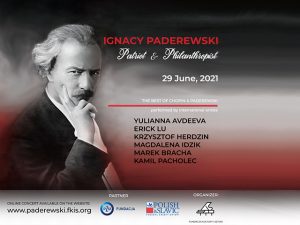 Ignacy Paderewski was in his time the richest artist in the world. He received dizzying royalties from Steinway, the piano manufacturer and organizer of Paderewski’s concerts in the USA. Already the first tour in 1891 brought a “modest” income of today’s 1.9 million dollars, in addition the artist earned money from occasional recitals for millionaires and the sale of music editions of his own compositions. The famous Minuet in G major was published in the USA in one million copies. Ignacy Paderewski earned huge money, but he knew how to share it. His contemporaries pointed to his generosity and generous nature, his friends claimed that helping others gave him the greatest joy. He donated the income from his concerts to many causes, including the House of St Casimir in Paris, veterans of the January Uprising, famine victims in Galicia and Polish children in Września. He helped the indigent Polish community in America, student organizations, poor artists in the USA and in Poland, funded scholarships for young musicians and young composers, donated $28,600 as the largest single donation to help American war invalids.There were so many donations that it is impossible to mention them. During his first tour of America, Paderewski donated over four thousand dollars to the George Washington Arch in New York City. After a concert in Warsaw, gave 26,314 rubles to poor students of the University of Warsaw, junior and high school students, students of the Music Institute, the Society for the Care of Poor Mothers and Children, poor families, the Children’s Hospital in Warsaw, and the Orchestra and Choir of the Grand Theatre. Ignacy Paderewski supported activities that were to perpetuate in the consciousness of his compatriots the figure and works of F. Chopin. On October 14th, 1894, a monument with a bust of the composer was unveiled in Zelazowa Wola. This would not have been possible if it had not been for a donation of two thousand francs made by Paderewski. Large sum also was contributed to the fund for the construction of the monument of Frederic Chopin in the Royal Łazienki Park.
Ignacy Paderewski was in his time the richest artist in the world. He received dizzying royalties from Steinway, the piano manufacturer and organizer of Paderewski’s concerts in the USA. Already the first tour in 1891 brought a “modest” income of today’s 1.9 million dollars, in addition the artist earned money from occasional recitals for millionaires and the sale of music editions of his own compositions. The famous Minuet in G major was published in the USA in one million copies. Ignacy Paderewski earned huge money, but he knew how to share it. His contemporaries pointed to his generosity and generous nature, his friends claimed that helping others gave him the greatest joy. He donated the income from his concerts to many causes, including the House of St Casimir in Paris, veterans of the January Uprising, famine victims in Galicia and Polish children in Września. He helped the indigent Polish community in America, student organizations, poor artists in the USA and in Poland, funded scholarships for young musicians and young composers, donated $28,600 as the largest single donation to help American war invalids.There were so many donations that it is impossible to mention them. During his first tour of America, Paderewski donated over four thousand dollars to the George Washington Arch in New York City. After a concert in Warsaw, gave 26,314 rubles to poor students of the University of Warsaw, junior and high school students, students of the Music Institute, the Society for the Care of Poor Mothers and Children, poor families, the Children’s Hospital in Warsaw, and the Orchestra and Choir of the Grand Theatre. Ignacy Paderewski supported activities that were to perpetuate in the consciousness of his compatriots the figure and works of F. Chopin. On October 14th, 1894, a monument with a bust of the composer was unveiled in Zelazowa Wola. This would not have been possible if it had not been for a donation of two thousand francs made by Paderewski. Large sum also was contributed to the fund for the construction of the monument of Frederic Chopin in the Royal Łazienki Park.
In 1919, when Paderewski became a Prime Minister of the free Polish government, he founded and supported the independent daily newspaper “Rzeczpospolita”. He also donated money for the construction of a Sanatorium for lung patients in Zakopane, the Bristol Hotel and the Warsaw Philharmonic. In Cracow Paderewski founded the Grunwald Monument. although the idea of sacrificing a huge fortune to build the monument seemed to be a pipe dream to many. No one but the artist-founder and at the same time an incorrigible idealist would do such a thing. He also founded the Pulaski Monument in Washington, D.C., the Kosciuszko Monument in Chicago, the Mickiewicz Monument in Lvov, financed camps for Polish volunteers from the United States to join the emerging Polish army in France. Paderewski was one of the co-founders of the Committee to Aid Poles in Paris, together with Henryk Sienkiewicz founded the Swiss General Committee for Aid to War Victims in Poland. On June 28, 1919 Ignacy Paderewski took part in signing the Treaty of Versailles, the main peace treaty ending World War I. The Treaty restored Poland to the map of Europe after 123 years of captivity. Ignacy Paderewski’s achievements also include financial participation in the creation of the panorama Golgotha (Crucifixion) by Jan Styka. The panorama is considered the largest religious painting in the world. The number of charity concerts throughout Ignacy Paderewski’s career is staggering; his devotion to his country, philanthropy and the enormous sums he donated to charity are thought-provoking and serve as a model and inspiration for future generations.
The event organized in cooperation with the Roman Dmowski & Ignacy Paderewski Institute for the Heritage of National Thought, Paderewski Center in Kąśna Dolna, International Chopin Festival in Duszniki Zdrój, Jozef Pilsudski Institute of America, Polish Museum in America, Polish Community Association and Łazienki Królewskie in Warsaw.
Cardinal Stefan Wyszyński At the service of the nation
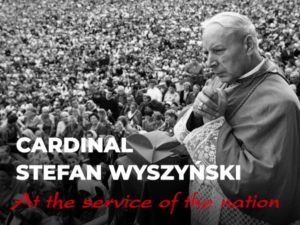 “Such a Man happens once in a thousand years” – These words were spoken by Pope John Paul II in the year of the death of Primate Cardinal Wyszynski. Primate went down in history as one of the greatest figures in the history of the Polish Church. His teaching and relations with the faithful as well as his unyielding attitude towards the communist authorities earned him, next to Karol Wojtyla, a permanent place among the most eminent Polish pastors of the 20th century. Stefan Wyszyński was born on August 3, 1901 in Zuzela on the Bug River, on the border between Podlasie and Mazovia, which at that time was part of the Russian partition. Already at the age of nine he refused to attend a Russian school and for two years he studied at home. Many years later Stefan Wyszyński became a priest and then a professor of canon law and sociology at the Major Seminary in Wloclawek. During the Warsaw Uprising Stefan Wyszyński worked as a chaplain of the institution for the blind in Laski near Warsaw. He gave lectures at clandestine universities, helped in hospital work, washed bandages and uniforms, transferred the sick and supported those undergoing operations. Later he returned to Wloclawek, where he began rebuilding the seminary. In 1946, he became bishop of Lublin and was consecrated bishop at Jasna Góra. Two years later Pope Pius XII appointed Stefan Wyszyński archbishop of Gniezno-Warsaw and Primate of Poland, and later cardinal. During the period of communist repression, Wyszynski defended the nation’s Christian identity. On September 25, 1953 he was arrested, without indictment, trial or sentence he was imprisoned for three years, until October 28, 1956. He was held in Rywałd Królewski, Stoczek Warmiński, Prudnik Śląski and Komańcza. In Rywałd he was guarded by 20 guards, he was not even allowed to look out of the window, which for security was covered with paper. Later he was moved to Stoczek Warmiński near Lidzbark, where he was guarded by more than 30 people. The living conditions in the soggy building were reminiscent of a prison dungeon, which soon took its toll on the Primate’s health. In October 1954, he was transferred to a new place of detention in Prudnik Slaski. The conditions there were already better, so he could work more intensively. In 1955, after another forced move, the Primate was taken to the Monastery of the Holy Family of Nazareth in Komańcza, where he could meet with his former colleagues. In 1956, warmly welcomed by crowds of the faithful. He returned to Miodowa Street in Warsaw.The years 1956-1966 were the most important period of Cardinal Stefan Wyszyński’s Primate ministry. During this time he developed and carried out a great pastoral program in Poland, which included the Jasna Góra Vows of the Nation, the nine-year Great Novena, and the celebration of the millennium of the Baptism of Poland.Primate presided over all the millennium celebrations that took place in 1966. Together with the Episcopate, he walked the “Millennium Trail” in great thanksgiving of the Nation and the Church. The culmination of the millennium celebrations was the feast of the Queen of Poland, May 3, 1966. Stefan Wyszynski was the only Polish cardinal who participated in the conclave four times. On October 16, 1978 he took part in the conclave which elected Karol Wojtyla as Pope. During the solemn inauguration of the pontificate of John Paul II in the Vatican, cardinals customarily paid homage to the Pope, while to the astonishment of the whole world, John Paul II, as a sign of respect for the Cardinal, rose from the throne, kissed his hand and shook it. Never in history has such a situation occurred. The crowning achievement in the life and desires of Cardinal Wyszynski was the first pilgrimage of John Paul II to his homeland in June 1979. Wyszynski treated his visit as a great celebration for the whole of Poland and a kind of completion of his mission: “Now I can really die,” he told his associates after the Pope’s departure. In the fall of that same year, JP2 said: “In considering the contribution which the Primate of the Millennium made to the life of the Church and the Polish Nation, it is necessary to bear in mind above all the unimaginable love with which this great man embraced both the whole ecclesial community and our whole national community – a man of great spirit and power of influence, and at the same time of immense humility and modesty, conscious of his service to God and people. For him, the concept of homeland was inseparably connected with the concept of the Church. They constituted an inseparable unity, which he wanted to serve humbly. As head of the Church in Poland he professed: “I love the homeland more than my own heart and everything I do for the Church, I do for her” Cardinals Wyszynski and Wojtyla shared a deep friendship. The Metropolitan of Krakow regularly visited the Primate during his holidays, including in Bachledowka in Zakopane and near Warsaw. They had long conversations, discussed matters important to the Church and the nation, but also played volleyball. The Primate often refereed. The Archbishop of Krakow knew how important Primate Wyszynski was for the Church, and he had a special respect for him. Cardinal Wyszynski was an unquestionable moral authority, a spiritual co-creator of social changes that led to the fall of communism. Stefan Wyszynski, Primate of Poland, passed away on May 28, 1981, the Solemnity of the Ascension of the Lord. He was 80 years old, of which 57 years he lived as a priest, 35 years as a bishop, 32 years as Archbishop of Warsaw and Gniezno, Primate of Poland. The funeral of Cardinal Wyszynski became a great religious and patriotic manifestation. It was a funeral that expressed respect and honor for the Primate of the Millennium, who was called the father of the Nation. The funeral ceremonies were honoured by the Church hierarchs from all over the world. In a letter to the Poles, which at the same time was a tribute to the deceased, Pope John Paul II wrote that Cardinal Wyszynski was a fearless advocate of human dignity and his inviolable rights in personal, family, social and national life, noting that the Primate was a special example of living love for the Homeland. Cardinal Stefan Wyszynski, an outstanding statesman considered one of the greatest Poles of the twentieth century, led the Catholic Church in Poland in the years 1948-1981. He was called the Primate of the Millennium, the nation’s chaplain in times of trial, a hero of the Church, a symbol of Polish courage, the Primate of historic changes.
“Such a Man happens once in a thousand years” – These words were spoken by Pope John Paul II in the year of the death of Primate Cardinal Wyszynski. Primate went down in history as one of the greatest figures in the history of the Polish Church. His teaching and relations with the faithful as well as his unyielding attitude towards the communist authorities earned him, next to Karol Wojtyla, a permanent place among the most eminent Polish pastors of the 20th century. Stefan Wyszyński was born on August 3, 1901 in Zuzela on the Bug River, on the border between Podlasie and Mazovia, which at that time was part of the Russian partition. Already at the age of nine he refused to attend a Russian school and for two years he studied at home. Many years later Stefan Wyszyński became a priest and then a professor of canon law and sociology at the Major Seminary in Wloclawek. During the Warsaw Uprising Stefan Wyszyński worked as a chaplain of the institution for the blind in Laski near Warsaw. He gave lectures at clandestine universities, helped in hospital work, washed bandages and uniforms, transferred the sick and supported those undergoing operations. Later he returned to Wloclawek, where he began rebuilding the seminary. In 1946, he became bishop of Lublin and was consecrated bishop at Jasna Góra. Two years later Pope Pius XII appointed Stefan Wyszyński archbishop of Gniezno-Warsaw and Primate of Poland, and later cardinal. During the period of communist repression, Wyszynski defended the nation’s Christian identity. On September 25, 1953 he was arrested, without indictment, trial or sentence he was imprisoned for three years, until October 28, 1956. He was held in Rywałd Królewski, Stoczek Warmiński, Prudnik Śląski and Komańcza. In Rywałd he was guarded by 20 guards, he was not even allowed to look out of the window, which for security was covered with paper. Later he was moved to Stoczek Warmiński near Lidzbark, where he was guarded by more than 30 people. The living conditions in the soggy building were reminiscent of a prison dungeon, which soon took its toll on the Primate’s health. In October 1954, he was transferred to a new place of detention in Prudnik Slaski. The conditions there were already better, so he could work more intensively. In 1955, after another forced move, the Primate was taken to the Monastery of the Holy Family of Nazareth in Komańcza, where he could meet with his former colleagues. In 1956, warmly welcomed by crowds of the faithful. He returned to Miodowa Street in Warsaw.The years 1956-1966 were the most important period of Cardinal Stefan Wyszyński’s Primate ministry. During this time he developed and carried out a great pastoral program in Poland, which included the Jasna Góra Vows of the Nation, the nine-year Great Novena, and the celebration of the millennium of the Baptism of Poland.Primate presided over all the millennium celebrations that took place in 1966. Together with the Episcopate, he walked the “Millennium Trail” in great thanksgiving of the Nation and the Church. The culmination of the millennium celebrations was the feast of the Queen of Poland, May 3, 1966. Stefan Wyszynski was the only Polish cardinal who participated in the conclave four times. On October 16, 1978 he took part in the conclave which elected Karol Wojtyla as Pope. During the solemn inauguration of the pontificate of John Paul II in the Vatican, cardinals customarily paid homage to the Pope, while to the astonishment of the whole world, John Paul II, as a sign of respect for the Cardinal, rose from the throne, kissed his hand and shook it. Never in history has such a situation occurred. The crowning achievement in the life and desires of Cardinal Wyszynski was the first pilgrimage of John Paul II to his homeland in June 1979. Wyszynski treated his visit as a great celebration for the whole of Poland and a kind of completion of his mission: “Now I can really die,” he told his associates after the Pope’s departure. In the fall of that same year, JP2 said: “In considering the contribution which the Primate of the Millennium made to the life of the Church and the Polish Nation, it is necessary to bear in mind above all the unimaginable love with which this great man embraced both the whole ecclesial community and our whole national community – a man of great spirit and power of influence, and at the same time of immense humility and modesty, conscious of his service to God and people. For him, the concept of homeland was inseparably connected with the concept of the Church. They constituted an inseparable unity, which he wanted to serve humbly. As head of the Church in Poland he professed: “I love the homeland more than my own heart and everything I do for the Church, I do for her” Cardinals Wyszynski and Wojtyla shared a deep friendship. The Metropolitan of Krakow regularly visited the Primate during his holidays, including in Bachledowka in Zakopane and near Warsaw. They had long conversations, discussed matters important to the Church and the nation, but also played volleyball. The Primate often refereed. The Archbishop of Krakow knew how important Primate Wyszynski was for the Church, and he had a special respect for him. Cardinal Wyszynski was an unquestionable moral authority, a spiritual co-creator of social changes that led to the fall of communism. Stefan Wyszynski, Primate of Poland, passed away on May 28, 1981, the Solemnity of the Ascension of the Lord. He was 80 years old, of which 57 years he lived as a priest, 35 years as a bishop, 32 years as Archbishop of Warsaw and Gniezno, Primate of Poland. The funeral of Cardinal Wyszynski became a great religious and patriotic manifestation. It was a funeral that expressed respect and honor for the Primate of the Millennium, who was called the father of the Nation. The funeral ceremonies were honoured by the Church hierarchs from all over the world. In a letter to the Poles, which at the same time was a tribute to the deceased, Pope John Paul II wrote that Cardinal Wyszynski was a fearless advocate of human dignity and his inviolable rights in personal, family, social and national life, noting that the Primate was a special example of living love for the Homeland. Cardinal Stefan Wyszynski, an outstanding statesman considered one of the greatest Poles of the twentieth century, led the Catholic Church in Poland in the years 1948-1981. He was called the Primate of the Millennium, the nation’s chaplain in times of trial, a hero of the Church, a symbol of Polish courage, the Primate of historic changes.
The event was organized in cooperation with the Roman Dmowski and Ignacy Paderewski Institute for the Heritage of National Thought, the Primate Institute of Stefan Cardinal Wyszynski, the Polish Community Association and the Royal Łazienki in Warsaw.
210 YEARS WITH CHOPIN
 210 years ago was born Fryderyk Chopin, one of the greatest pianists and composers in the history of music. His short life was full of major events, ups and downs, successes and dramas. Chopin was a musical genius, a talented composer and an unsurpassed pianist. He combined bold musical ideas with simplicity and folk motifs. He left behind music that exceeds the boundaries of beauty, his nocturnes, polonaises, waltzes, etudes, mazurkas, preludes and piano concerts made him one of the greatest composers of all time. Mastery of form, melodic and harmonic richness later became an unsurpassed model for many composers. In order to understand Chopin’s genius, we delve into the emotions rooted in his works.
210 years ago was born Fryderyk Chopin, one of the greatest pianists and composers in the history of music. His short life was full of major events, ups and downs, successes and dramas. Chopin was a musical genius, a talented composer and an unsurpassed pianist. He combined bold musical ideas with simplicity and folk motifs. He left behind music that exceeds the boundaries of beauty, his nocturnes, polonaises, waltzes, etudes, mazurkas, preludes and piano concerts made him one of the greatest composers of all time. Mastery of form, melodic and harmonic richness later became an unsurpassed model for many composers. In order to understand Chopin’s genius, we delve into the emotions rooted in his works.
The 210 YEARS WITH CHOPIN concert is a musical journey through time from Chopin’s youthful brilliant compositions, through heroic pieces from the immigration period, highly expressive pieces to sentimental pieces created at the end of the composer’s life. The program emphasizing its national character includes works by F. Chopin in the order of their creation. The concert featured outstanding artists: the star of the Metropolitan Opera Aleksandra Kurzak, winners of the International Chopin Competition in Warsaw: Yulianna Avdeeva and Eric Lu, also Marek Bracha and soloists of the Wrocław Opera Ballet: Hannah Ho and Robert Kędziński. The concert was organized in cooperation with the Foundation of the International Chopin Festivals in Duszniki Zdrój and the Polish Community Association. The patron of the concert is the Patron of Polish Culture PGE Polska Grupa Energetyczna, the Partner of the PZU Foundation.
PADEREWSKI, A JOURNEY IN TIME
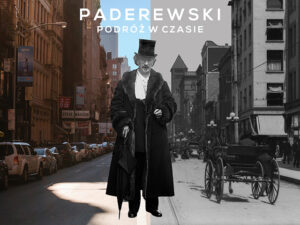 Concert was realized in cooperation with the Roman Dmowski and Ignacy Jan Paderewski Institute for the Heritage of the National Thought. Together with Paderewski, we moved to the times of Poland under the partitions, the times when Poland enjoyed the freedom it had gained, and at the end we saw how contemporary artists perceive Paderewski. The concert is a compendium of knowledge about Paderewski, presenting little-known episodes from the composer’s life and works by Ignacy Paderewski performed by outstanding artists: Karol Radziwonowicz, Marek Bracha and Basia Pospieszalska. The figure of Ignacy Paderewski is extremely interesting and multidimensional. He was a citizen of the world, a statesman, diplomat, virtuoso, composer, advocate of independent Poland, and above all a great patriot. He referred to working for a common cause, higher ideals and unity of all Poles. The motto of Paderewski’s life was: “For the consent and cooperation of all free Poles.
Concert was realized in cooperation with the Roman Dmowski and Ignacy Jan Paderewski Institute for the Heritage of the National Thought. Together with Paderewski, we moved to the times of Poland under the partitions, the times when Poland enjoyed the freedom it had gained, and at the end we saw how contemporary artists perceive Paderewski. The concert is a compendium of knowledge about Paderewski, presenting little-known episodes from the composer’s life and works by Ignacy Paderewski performed by outstanding artists: Karol Radziwonowicz, Marek Bracha and Basia Pospieszalska. The figure of Ignacy Paderewski is extremely interesting and multidimensional. He was a citizen of the world, a statesman, diplomat, virtuoso, composer, advocate of independent Poland, and above all a great patriot. He referred to working for a common cause, higher ideals and unity of all Poles. The motto of Paderewski’s life was: “For the consent and cooperation of all free Poles.
Ignacy Paderewski is a living example of how much a person of modest origin, but with exceptional talents can achieve. Paderewski ordered the inscription on his grave: “I am here only temporarily. I intend to return to Poland when it becomes an independent country again. ” The composer’s wish came true, his ashes were brought to Poland and deposited in the crypt in the Cathedral of St. John in Warsaw. The magnificent grave of the artist-politician at the Arlington Cemetery has remained and continues to attract the attention of millions of Americans
Concert in Memory of John Paul II
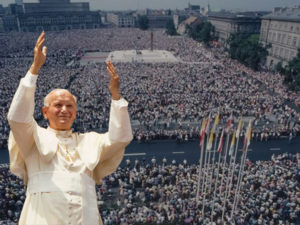 The hundredth anniversary of the birth of John Paul II is an extraordinary opportunity to recall the message with which Pope John Paul II visited millions of believers around the world. For almost 27 years of His pontificate, He gained the sympathy of people of all skin colors and religions. The teaching of the Holy Father was full of humanism. He devoted all of His knowledge to man, his problems, injustice and poverty, carrying a spiritual message that was able to change the face of the world and the Church. John Paul II traveled thousands of kilometers to bring a call of love and peace. During his 104 pilgrimages, he visited 129 countries with crowds greeting him on all continents. No other person in the world saw so many people praying, crying, laughing and cheering in his honor. For the Polish-Americans and the so-called Polonia, he was a source of great pride. John Paul II always emphasized the contribution of Polonia to the promotion of Polish culture in the world and its determination in building a spiritual identity based on the Polish national heritage.
The hundredth anniversary of the birth of John Paul II is an extraordinary opportunity to recall the message with which Pope John Paul II visited millions of believers around the world. For almost 27 years of His pontificate, He gained the sympathy of people of all skin colors and religions. The teaching of the Holy Father was full of humanism. He devoted all of His knowledge to man, his problems, injustice and poverty, carrying a spiritual message that was able to change the face of the world and the Church. John Paul II traveled thousands of kilometers to bring a call of love and peace. During his 104 pilgrimages, he visited 129 countries with crowds greeting him on all continents. No other person in the world saw so many people praying, crying, laughing and cheering in his honor. For the Polish-Americans and the so-called Polonia, he was a source of great pride. John Paul II always emphasized the contribution of Polonia to the promotion of Polish culture in the world and its determination in building a spiritual identity based on the Polish national heritage.
On the 100th anniversary of the birth of Karol Wojtyła, 40 outstanding artists from Poland, the United States, England, Germany, Korea, Italy, Japan, Taiwan, Turkey and Switzerland paid tribute to the Great Pole. The Concert program included Ave Maria by F. Schubert performed by Angel Joy Blue, a soloist of the Metropolitan Opera in NY, well known for her title role of Bess in Porgy & Bess by G. Gershwin, Panis Angelicus and Laudate Dominum by W.A. Mozart performed by another two soloists of the Metropolitan Opera, MaryAnn McCormick and Lisette Oropesa, who had gained outstanding acclaim for the main roles of Violetta in Traviata by G. Verdi and Manon by J. Massenet. Program also included Meditation from the Opera Thais by J. Massenet played by Piotr Pławner and Piotr Sałajczyk with the participation of Dagmara Dryl, the first soloist of the Polish National Ballet, choreographed by Zofia Rudnicka, Ave Maria from the Opera Otello by G. Verdi performed by Latonia Moore, the performer of the main role of Aida at the Metropolitan Opera, Lamb of God performed by Brandie Sutton to the accompaniment of Damien Sneed who collaborated with such stars as Aretha Franklin, Jessye Norman, Wynton Marsalis, Stevie Wonder and Diane Ross. Soloists of the Polish National Opera Edyta Piasecka performed the Nai song by S. Moniuszko, Aleksandra Olczyk Pie Jesu, and Rafał Bartmiński rarely performed song “Pray for my soul” from the Polish Mass by Jan Maklakiewicz. Performed also great instrumentalists like Veriko Tchumburidze, first prize winner of the last International H. Wieniawski Violin Competition as well as Janusz Wawrowski, Richard Lin, Magdalena Stern-Baczewska and Adam Palma, who perform F. Chopin’s Polonaise in A major on guitar. You can find more information at www.jp2concert.com
The concert tied was music of F. Chopin performed by Szymon Nehring in the beautiful scenery of the Wawel Royal Castle in Krakow. It was in Krakow at the local Theological Seminary that young Karol Wojtyła was educated, later becoming the head of the Catholic Church. The Concert was interspersed with the world premiere of the aria from the Opera of Hiob by Krzesimir Dębski performed by Aneta Łukaszewicz, based on a play by Karol Wojtyła, commissioned by the Polish Royal Opera.
Blessing was given by His Eminence Cardinal Stanisław Dziwisz, His Excellency Archbishop Stanisław Gądecki – Chairman of the Polish Episcopal Conference, His Eminence Cardinal Timothy Dolan, from the Archdiocese of New York, who made a concert opening remarks. The event was held under the patronage of the John Paul II Foundation in Rome, Institute of the Heritage of National Thought by R. Dmowski and I. Paderewski, JP2 Thought Center in Warsaw, the Polish Community Association, the Consulate General of the Republic of Poland in New York, the Józef Piłsudski Institute of America.
The Concert Patron was PGNiG, Partners: Bank BGK and Polish & Slavic Federal Credit Union. The online broadcast took place on June 21, 2020
CARNEGIE HALL/Stern Auditorium
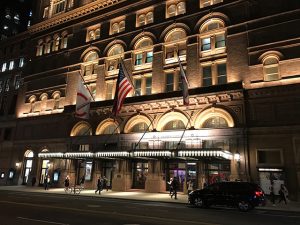
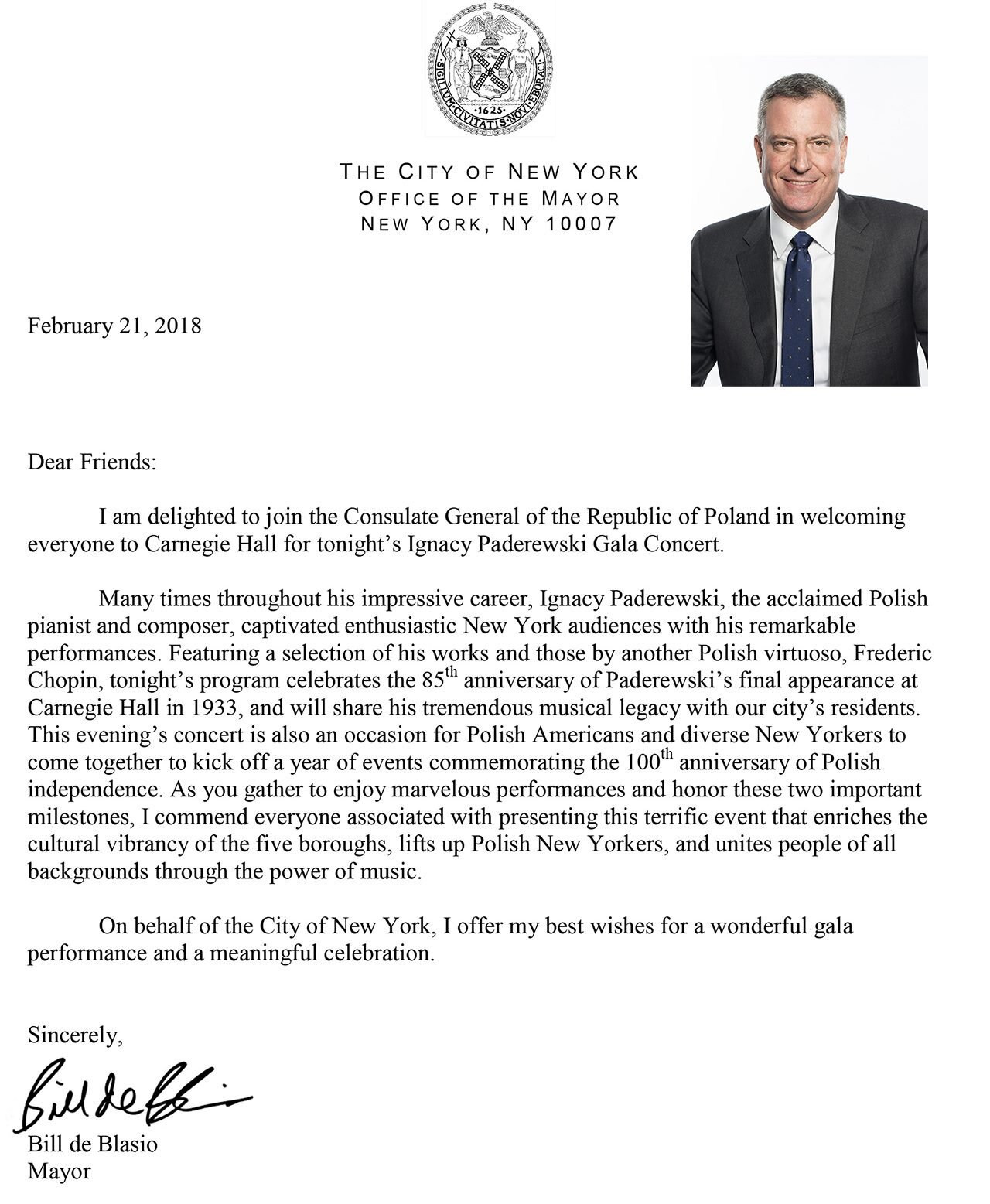
Concert Gala “Maestro returns to Carnegie Hall” took place at Carnegie Hall Stern Auditorium in Memory of I. Paderewski on the 85th anniversary of his last concert at Carnegie Hall. Concert initiated the celebration of the 100th anniversary of Poland regaining its independence on the US with the participation on official delegation of the Polish Parliament, Sejm Deputy Marshal Beata Mazurek, Minister of Foreign Affairs Jacek Czaputowicz, Polish Ambassador to the USA Piotr Wilczek, Secretary of State Anna Maria Anders, EU Ambassador to the United Nations Joao Vale de Almeida, Polish Ambassador to the UN Joanna Wronecka, Consul General of the Republic of Poland in NY Maciej Golubiewski, representatives of New York City authorities, Ambassadors at UN Security Council, over 100 representatives of state missions to the United Nations, Director of the American Jewish Committee, Ambassadors and General Consuls of many countries, representatives of the Association of Veterans of the Polish Army in America, representatives of numerous diasporas, management of the Piłsudski Institute of America, Polish Slavic Center, Polish Institute of Arts & Science of America, and the Board of management of the Quin Hotel, where Paderewski often stayed, calling the Hotel his second home. The event was a great media success, the Stern Auditorium with over 2800 seats was filled to the brim.
CHRISTMAS SHOW
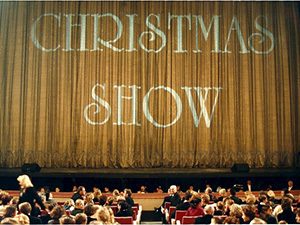 Christmas Show is the largest Christmas Event in Poland, with over 100 artists on the stage. Premiere took place at the Grand Theater, Polish National Opera House. In 2018 Show was shown at the Roma Music Theater in Warsaw. The Christmas Show is an extraordinary journey into the world of the most beautiful Christmas traditions. Program consists of “Christmas Carol” by K. Dickens, ballet scenes from “The Nutcracker”, Waltz of Snowflakes, Grand Pas de Deux, Dance of Gifts by P. Tchaikovsky, winter scenes to the music of Antonio Vivaldi, Opera arias, Flower Duo from the Opera Lakme and Delibes, moody meditation from the Thais opera by Jules Massenet, the Christmas Crib and a meeting with Polish tradition in its most beautiful edition. In Christmas Show performed many outstanding artists, such soloists of the Polish National Opera House: Małgorzata Walewska, Izabella Kłosińska, Katarzyna Trylnik, Magdalena Idzik, Justynea Reczeniedi, Aleksandra Orłowska-Jabłońska, Adam Kruszewski, Adam Zdunikowski, Jacek Szponarski, Polish National Ballet and Polish National Ballet soloists such, Marta Fidler, Melissa Abel, Maksim Woitiul, Grand Theater Orchestra, famous polish actors: Zdzisław Wardejn, Jerzy Bończak, Wiktor Zborowski, Artur Barciś, Piotr Zelt, Wojciech Duryasz, Mirosław Zbrojewicz, Marek Lewandowski, Grzegorz Woś, Piotr Wiszniowski, Dariusz Wnuk and others. Performing great Choirs including the famous Warsaw Boys’ Choir conducted by Krzysztof Kusiel-Moroz. Occurred life animals such camels, goats, horses and reindeers. The spectacle is addressed to entire families, lovers of theater, opera and ballet, the varied program means that everyone can find something for themselves.
Christmas Show is the largest Christmas Event in Poland, with over 100 artists on the stage. Premiere took place at the Grand Theater, Polish National Opera House. In 2018 Show was shown at the Roma Music Theater in Warsaw. The Christmas Show is an extraordinary journey into the world of the most beautiful Christmas traditions. Program consists of “Christmas Carol” by K. Dickens, ballet scenes from “The Nutcracker”, Waltz of Snowflakes, Grand Pas de Deux, Dance of Gifts by P. Tchaikovsky, winter scenes to the music of Antonio Vivaldi, Opera arias, Flower Duo from the Opera Lakme and Delibes, moody meditation from the Thais opera by Jules Massenet, the Christmas Crib and a meeting with Polish tradition in its most beautiful edition. In Christmas Show performed many outstanding artists, such soloists of the Polish National Opera House: Małgorzata Walewska, Izabella Kłosińska, Katarzyna Trylnik, Magdalena Idzik, Justynea Reczeniedi, Aleksandra Orłowska-Jabłońska, Adam Kruszewski, Adam Zdunikowski, Jacek Szponarski, Polish National Ballet and Polish National Ballet soloists such, Marta Fidler, Melissa Abel, Maksim Woitiul, Grand Theater Orchestra, famous polish actors: Zdzisław Wardejn, Jerzy Bończak, Wiktor Zborowski, Artur Barciś, Piotr Zelt, Wojciech Duryasz, Mirosław Zbrojewicz, Marek Lewandowski, Grzegorz Woś, Piotr Wiszniowski, Dariusz Wnuk and others. Performing great Choirs including the famous Warsaw Boys’ Choir conducted by Krzysztof Kusiel-Moroz. Occurred life animals such camels, goats, horses and reindeers. The spectacle is addressed to entire families, lovers of theater, opera and ballet, the varied program means that everyone can find something for themselves.
For the Freedom of Our Nations
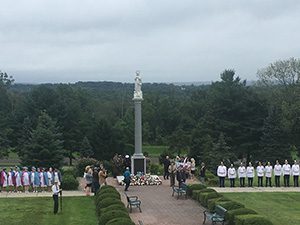 Concert “For the Freedom of Our Nations” was organized in Doylestown, Pennsylvania during the celebrations of the Day of the Soldier and Centenary of the Armed Forces of the American and Canadian Polish Community in the year of the 100th anniversary of Poland regaining independence. The paths to the independence of the United States and Poland have repeatedly crossed; love for freedom and the desire for justice have always been deeply rooted in our hearts. Many Poles fought to defend the independence of the United States, Tadeusz Kościuszko was named by President Thomas Jefferson “the noblest son of freedom,” and General Pulaski gave his life at the Battle of Savannah. On October 11, 2007, President George Bush said: “Celebrating General Pulaski Memorial Day, we honor the son of Poland, who was with America at the dawn of its independence. His bold achievements in America remind us of the great contribution that Americans of Polish descent make to America. “During the concert” For the Freedom of Our Nations, “pieces by F. Chopin, St. Moniuszki, I. Paderewski. Soloists of the Teatr Wielki / Polish National Opera and Marek Bracha performed for the first time in American Częstochowa, a talented pianist, laureate of many international piano competitions, Polish representative during the second stage of the 16th International Piano Competition. Frederic Chopin. Visitors to American Częstochowa had the opportunity to see two interesting exhibitions, ‘Million from Over the Ocean’, an exhibition organized in cooperation with the Museum of the Second World War in Gdańsk and an exhibition ‘General Kuklinski – Polish Lonely Mission’ organized in cooperation with the General Kuklinski Memorial Hall. The ceremony was attended by representatives of the Government and Parliament of the Republic of Poland, the Ambassador of the Republic of Poland in Washington Piotr Wilczek, Consul General of the Republic of Poland in NY Maciej Golubiewski, General Cezary Wiśniewski, and numerous Honorary Guests.
Concert “For the Freedom of Our Nations” was organized in Doylestown, Pennsylvania during the celebrations of the Day of the Soldier and Centenary of the Armed Forces of the American and Canadian Polish Community in the year of the 100th anniversary of Poland regaining independence. The paths to the independence of the United States and Poland have repeatedly crossed; love for freedom and the desire for justice have always been deeply rooted in our hearts. Many Poles fought to defend the independence of the United States, Tadeusz Kościuszko was named by President Thomas Jefferson “the noblest son of freedom,” and General Pulaski gave his life at the Battle of Savannah. On October 11, 2007, President George Bush said: “Celebrating General Pulaski Memorial Day, we honor the son of Poland, who was with America at the dawn of its independence. His bold achievements in America remind us of the great contribution that Americans of Polish descent make to America. “During the concert” For the Freedom of Our Nations, “pieces by F. Chopin, St. Moniuszki, I. Paderewski. Soloists of the Teatr Wielki / Polish National Opera and Marek Bracha performed for the first time in American Częstochowa, a talented pianist, laureate of many international piano competitions, Polish representative during the second stage of the 16th International Piano Competition. Frederic Chopin. Visitors to American Częstochowa had the opportunity to see two interesting exhibitions, ‘Million from Over the Ocean’, an exhibition organized in cooperation with the Museum of the Second World War in Gdańsk and an exhibition ‘General Kuklinski – Polish Lonely Mission’ organized in cooperation with the General Kuklinski Memorial Hall. The ceremony was attended by representatives of the Government and Parliament of the Republic of Poland, the Ambassador of the Republic of Poland in Washington Piotr Wilczek, Consul General of the Republic of Poland in NY Maciej Golubiewski, General Cezary Wiśniewski, and numerous Honorary Guests.
„BASK REVELATION OF AMERICA”
 Documentary film promoting Poland, was shown in NY and Hong Kong, won 8 awards – 6 for directing and two main awards. Became the winner of the New York International Film Festival – Equus Film Festival 2017. Film presents fascinating story of an Arabian horse named Bask, who was born and raised in the Polish Albigowa Stud. In 1963, he was sold to the United States, where after a dramatic trip across the Atlantic Ocean he reached Arizona. Bask made a stunning career in the United States, and the audience there simply fell in love with him. The stallion from Poland was also a real star and as such had its own requirements – when he went to shows in other states, two cisterns were dragged behind him, because he only drank water from sources in Arizona. Today, in the horse museum in Kentucky, you can admire the entire exhibition devoted to the Polish stallion. – The artist Edwin Bogucki, of Polish origin, carved a life-size statue of Bask, which is also rare, because in general the horse is not depicted alone, but accompanies the emperor or another outstanding personality. Now is standing in the lobby of the Kentucky Museum, where Bask is also buried. Ed Bogucki carved horses for a huge number of powerful of this world, including Arab sheikhs or Bill Gates. Bask is considered the greatest Arabian horse in the entire history of breeding these horses in the world, and the Americans hailed him as “the revelation of America.” The stallion left 1,045 Arabian foals, and his offspring at various shows won 505 Championships and 197 National Champion title. To date, no Arabian horse in the world had such achievements. Most American politicians, actors and celebrities have in their stables descendants of Bask, who they consider to be “family jewels”, due to, among others at the price of his offspring. The best breeders, trainers and people who love horses, like Shirley Watts, Denise Hearst, Lynn Asby, Lare Sawaya, Katarzyna Dowbor, Karol Strasburger were invited to give interviews.
Documentary film promoting Poland, was shown in NY and Hong Kong, won 8 awards – 6 for directing and two main awards. Became the winner of the New York International Film Festival – Equus Film Festival 2017. Film presents fascinating story of an Arabian horse named Bask, who was born and raised in the Polish Albigowa Stud. In 1963, he was sold to the United States, where after a dramatic trip across the Atlantic Ocean he reached Arizona. Bask made a stunning career in the United States, and the audience there simply fell in love with him. The stallion from Poland was also a real star and as such had its own requirements – when he went to shows in other states, two cisterns were dragged behind him, because he only drank water from sources in Arizona. Today, in the horse museum in Kentucky, you can admire the entire exhibition devoted to the Polish stallion. – The artist Edwin Bogucki, of Polish origin, carved a life-size statue of Bask, which is also rare, because in general the horse is not depicted alone, but accompanies the emperor or another outstanding personality. Now is standing in the lobby of the Kentucky Museum, where Bask is also buried. Ed Bogucki carved horses for a huge number of powerful of this world, including Arab sheikhs or Bill Gates. Bask is considered the greatest Arabian horse in the entire history of breeding these horses in the world, and the Americans hailed him as “the revelation of America.” The stallion left 1,045 Arabian foals, and his offspring at various shows won 505 Championships and 197 National Champion title. To date, no Arabian horse in the world had such achievements. Most American politicians, actors and celebrities have in their stables descendants of Bask, who they consider to be “family jewels”, due to, among others at the price of his offspring. The best breeders, trainers and people who love horses, like Shirley Watts, Denise Hearst, Lynn Asby, Lare Sawaya, Katarzyna Dowbor, Karol Strasburger were invited to give interviews.
COPERNICUS CENTER
 Concert „In the Service of Homeland and Science” organized during the annual event “Taste Of Polonia” as part of the celebration of the 100th anniversary of Poland regaining independence. The program included works by F. Chopin, I. Paderewski and K. Szymanowski. Great pianists performed: prof. Paweł Chęciński, graduate of the renowned Juilliard School in NY, winner of many prestigious awards, and Piotr Pawlak, a talented pianist of the young generation from Gdańsk, the youngest Pole qualified for the International Piano Competition F. Chopin in Warsaw, winner of the Chopin Competition in Darmstadt.
Concert „In the Service of Homeland and Science” organized during the annual event “Taste Of Polonia” as part of the celebration of the 100th anniversary of Poland regaining independence. The program included works by F. Chopin, I. Paderewski and K. Szymanowski. Great pianists performed: prof. Paweł Chęciński, graduate of the renowned Juilliard School in NY, winner of many prestigious awards, and Piotr Pawlak, a talented pianist of the young generation from Gdańsk, the youngest Pole qualified for the International Piano Competition F. Chopin in Warsaw, winner of the Chopin Competition in Darmstadt.

